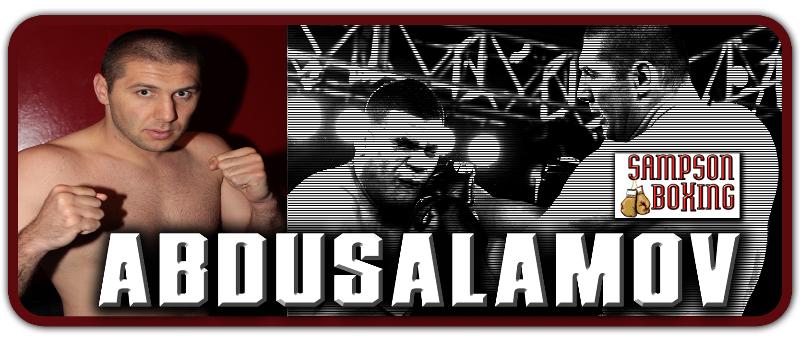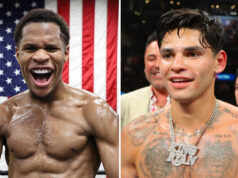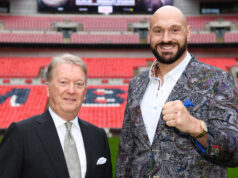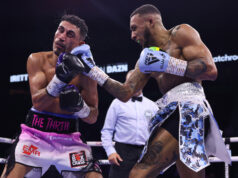Cornermen Behaving Badly:
There was a time in this sport where you had guys like Eddie Futch who was willing to stop a huge fight like the Thrilla in Manila before the last round because his charge Joe Frazier had soaked enough too much punishment. Boxing needs more trainers like that, men who have the gumption to make the difficult decisions. It seems like trainers of today aren’t willing to pull the trigger on a tough decision like giving their fighter the hook, especially if that fighter is still even marginally competitive in the fight.
I was disgusted with the Mike Alvarado stoppage a few weeks ago, when “Mile High” Mike’s corner, unwilling to readily acknowledge the obvious, forced the fighter to verbally surrender. It was their job to let their fighter save face and make that decision themselves. It was time for the trainer to have a “take charge” moment and he didn’t get it done. At least Alvarado had the good sense to know he had seen enough punishment for the night. But what if he didn’t? It shouldn’t be up to him in the first place.
A trainer should never put his fighter in a position where he has to run up the white flag while sitting on his stool. Cornermen used to know this instinctively. The chief second shouldn’t approach a potential corner stoppage with “I want to stop this fight, now convince me otherwise.” They need to take charge. Alvarado had clearly lost his zest for combat. To his trainer’s credit, he appeared to know this, as well, and even if Alvarado didn’t call it a day, he probably would have stopped it anyway. That’s not the point, though. Let’s see some trainers start to make these calls, not the fighters.
Saturday saw two fighters in Hernan Marquez and Magomed Abdusalamov suffer terrible beatings that landed them in the hospital. Abdusalamov caught the worst of it, being put into a medically-induced coma with part of his skull removed to alleviate swelling on the brain. Right now, a machine is keeping him alive. Again, we had cornermen not willing to make tough decisions.
When considering whether a fighter has taken too much punishment to warrant stopping the fight, it’s hard to not account for things like if he’s in the fight with a chance to win, if he can turn it around with one punch, or how much heart the fighter may have. His chances to win are a consideration, but it should lag far behind an appraisal of how bad of a beating he is absorbing.
The trainer’s job is to protect the fighter. And when all other avenues fail, they need to be the safety net. When the referees and doctors can’t make the decision, the corner needs to–plain and simple. They are entrusted with the health of the fighter and they know him the best.
The Abdusalamov case is one where I hesitate to take the trainer to task. To have outrage after the fact only in light of the unfortunate result of the beating is unfair. Unless one had outrage during the fight, it’s not right to become outraged afterwards just because of what happened. Still, even if you were not calling for the fight to be stopped, it was hard not to be a little taken aback at how Abdusalamov’s corner didn’t appear to even broach the subject of stopping the fight. Or how little attention they paid to the stoic Abdulsalamov’s complaints of a facial injury.
John David Jackson is a fine trainer, but the situation seemed lost on him a bit on Saturday. Maybe it was the language barrier. During the bout, Jackson could be heard saying “What did he say?”
A good starting point to stopping fights is anytime the structure of the head is compromised. A busted nose is one thing, but when a cheekbone or orbital bone is broken, that should warrant a stoppage. If a fighter is poker-faced and it escapes everyone’s attention, what can you do? But when fighters are expressing distress over serious structural facial injuries, how can you let them soldier on like that?
I grow weary of hearing things like “he was punching back” or “he was still in the fight” when trying to justify why a beaten-down fighter should be allowed to continue. While it will always be easier to give a fighter the hook when he’s not competitive, where a fighter stands in a fight needs to become less of a consideration. The effects of a beating don’t resonate less just because a boxer is “in the fight.” The potential long-lasting damage of a thorough shellacking doesn’t dissipate because a fighter can still conceivably win.
In other words, how battered a fighter is has no connection to his standing in a fight. The beating stands on its own. It’s not contingent on a fighter’s chances to win. Many boxing classics were allowed to become classics due to a certain disregard of the massive punishment being absorbed. This isn’t to imply that all cornermen should get all skittish about their fighter taking shots. This is a sport where there are inescapable hazards. That doesn’t mean that the fraternity of cornermen couldn’t stand a little overall upgrade in the conscientiousness department.











